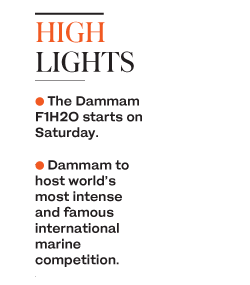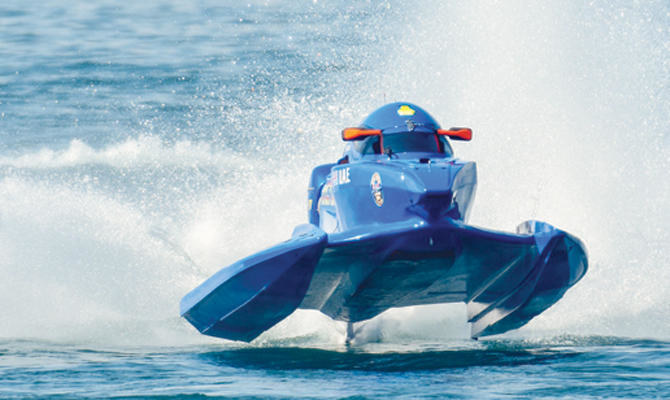DAMMAM: The Kingdom will host the opening round of the UIM Formula 1 World Powerboat Championship (F1H2O) at the Dammam Corniche.
Considered one of the world’s most competitive, dangerous and thrilling sports championships, the event will begin next Thursday and run for three days, culminating with 20 of the world’s most famous powerboat racers competing for the grand prix on Saturday.
Hosted by countries in Europe, Asia and the Middle East, the 2019 F1H2O circuits were officially unveiled at a press conference by the Union Internationale Motonautique (International Federation of Marine Sports) in Monaco on March 23, during which it was announced that Saudi Arabia will host the opening round, in the presence Prince Albert II of Monaco, world champion racers and senior F1H2O representatives.
The event will be held under the guidance of Prince Abdul Aziz bin Turki Al-Faisal, chairman of the General Sports Authority, and in cooperation with the Saudi Water Sports and Diving Federation (SWSDF).
Dammam hosting the event is a result of the efforts by the General Sports Authority to bring sports activities to the Kingdom by hosting prominent international events to enhance the local sports sector. These efforts also aim to reinforce Saudi Arabia’s position as a leading sports destination in the Middle East, in line with Saudi Vision 2030.
The race, which features 18 drivers from 11 countries, will mark the end of the Eastern Province Season, the first of the recently launched “Saudi Seasons” tourism campaign, which includes 11 tourist seasons spanning most of the Kingdom’s regions.
“The General Sports Authority is looking to significantly augment the local sports sector with various sports, leisure and tourism activities to boost its development and sustainability and key related sectors such as leisure and tourism, as well as strengthen the Kingdom’s position as a leading destination in the Middle East for the world’s largest events,” Prince Abdul Aziz bin Turki Al-Faisal said.
“We value the partnership we have forged with the International Federation of Marine Sports, through which we seek to support the Kingdom’s drive to transform the sports sector from the traditional model to a competitive model that boasts attractive investment, entertainment and tourism opportunities by adopting the very highest international standards.”
Prince Sultan bin Fahd bin Salman, chairman of the Saudi Water Sports and Diving Federation, said: “We are proud to host the F1 Powerboat World Championship and the 11 countries who are participating in the Dammam race. It will be the perfect culmination of the Eastern Province tourism season, the first of the recently launched Saudi Seasons initiative. Through these water sports, we aim to establish a new sports program of events and activities that will encourage more people to play sports and introduce these types of water sports to Saudi youth.”
Prince Sultan said that the event is expected to draw more 20,000 spectators from Saudi Arabia and abroad: “I take this opportunity to invite everyone to come and enjoy the event. I would also like to thank the event sponsors, and look forward to the results of the tremendous joint efforts between the various government bodies to provide a modern and unique experience for excitement and adventure seekers from Saudi Arabia and abroad.”
“Sports events hosted by Saudi Arabia in collaboration with global partners send a clear message that the Kingdom is opening its doors to the world and introducing it to its natural wonders and varied terrains, especially in the Eastern Province,” Prince Sultan said.
Former F1H20 President Nicolo di San Germano said: “We are delighted to start the 36th season of the UIM F1H2O World Championship in Dammam. I would like to thank the General Sports Authority, the SWSDF for their hard work and cooperation that has enabled us to extend our racing footprint in the Middle East and return to Saudi Arabia.”
“The championship and the sport of powerboat racing have a historic, highly successful and valued association with GCC countries which began in 1993, and we look forward to a renewed and long-lasting association of racing in Saudi Arabia,” di San Germano said.
Saudi Arabia to host F1 powerboat world championship opener
Saudi Arabia to host F1 powerboat world championship opener

- The race, which features 18 drivers from 11 countries, will mark the end of the Eastern Province Season, the first of the recently launched “Saudi Seasons” tourism campaign
Saudi FM arrives in Italy to attend G7 ministerial meeting

RIYADH: Saudi foreign minister Prince Faisal bin Farhan arrived in Italy on Sunday to participate in an expanded ministerial meeting of the Group of Seven (G7) countries in Fiuggi, Saudi Press Agency reported.
The meeting will discuss the current situation in the Middle East, SPA added.
During his stay in Fiuggi, Prince Faisal will hold a number of discussions that will address regional and international issues.
Saudi fund chief receives Tajikistan’s deputy prime minister

- Saudi Ambassador to Tajikistan Walid Al-Rashidan was among the officials in attendance
RIYADH: CEO of the Saudi Fund for Development Sultan Al-Marshad received First Deputy Prime Minister of Tajikistan Hokim Kholiqzoda and his accompanying delegation in Riyadh on Sunday.
During the meeting, the Saudi fund’s development projects were discussed, as well as ways to enhance development cooperation between both sides, the official account wrote on X.
Saudi Ambassador to Tajikistan Walid Al-Rashidan was among the officials in attendance.
Kholiqzoda’s visit included a tour of the Saudi fund’s exhibition center, which showcases the organization’s 50-year journey, including notable development projects and their impacts on the lives of beneficiaries.
World’s first International Conference on Conjoined Twins kicks off in Riyadh

- Top World Health Organization official commends Saudi Arabia’s efforts in the field
RIYADH: The inaugural International Conference on Conjoined Twins kicked off in Riyadh on Sunday.
The event unites leading medical experts, humanitarian organizations, and families from around the globe to share vital insights, discuss innovative separation techniques, and forge collaborative pathways in the pursuit of improved lives for conjoined twins.
Riyadh Gov. Prince Faisal bin Bandar delivered a speech on behalf of King Salman celebrating the achievements of the Saudi Conjoined Twins Program, which has become a global leader in the field.
“Since 1990, 143 cases of twins from 26 countries have been reviewed by my dear colleagues, who have successfully separated a total of 61 pairs of twins to date,” he said.
Prince Faisal added that it is the only program globally specializing in separating conjoined twins, making it one of the largest humanitarian medical programs in the world.
He also highlighted a recent milestone: the UN General Assembly is considering an initiative by Saudi Arabia to designate Nov. 24 as the annual World Conjoined Twins Day.
In a video address, Dr. Tedros Adhanom Ghebreyesus, director general of the World Health Organization, congratulated Saudi Arabia on its leadership in organizing the conference.
“I commend Saudi Arabia for its leadership in organizing this important World Conjoined Twins Day Conference,” he said.
This recognition would honor the medical and humanitarian efforts in this field and highlight the challenges faced by conjoined twins and their families.
Ghebreyesus praised the initiative as a model for global collaboration in rare and complex medical cases.
“The conference provides critical insights, from surgical innovations to long-term strategies, shaping rare initiatives. A broader platform and registry for congenital anomalies would benefit low and middle-income countries,” he said.
A keynote address was delivered by Dr. Abdullah Al-Rabeeah, advisor to the Royal Court and supervisor-general of Saudi aid agency KSrelief.
As the head of the multidisciplinary team for the Saudi Conjoined Twins Program, Al-Rabeeah provided insights into the occurrence and challenges associated with conjoined twins.
The history of conjoined twin separation reveals both the challenges and progress in medical science.
“The first successful separation was by Johannes Fatio back in 1689 by using a constricting band for a set of Omphalopagus twins or those sharing liver and gastrointestinal organs,” he said.
With a 0.5 percent incidence rate, this early success involved “presumably, a small joining in the skin, probably a little bit of the liver,” said Al-Rabeeah.
He added that a major breakthrough came in 1957 with the first successful separation of Craniopagus, or twins sharing one brain.
Al-Rabeeah said that the epidemiology shows distinct patterns: “In Western countries, it’s been estimated that we get one conjoined twins in every 50 to 200,000 births.”
He added that, however, it is more prevalent in Southeast Asia and Africa, “presumably because identical twinning and twinning is (found) more in dark-skinned people in Africa and also in Southeast Asia, increasing the incidence.”
The survival statistics, Al-Rabeeah reported, entail that “60 percent of conjoined twins are stillborn, and those who live 40 percent of them will die in the first few days of life, and 70 percent of those who would survive will be females.”
He emphasized that the reasons behind this regional disparity remain unknown and require further research.
Throughout the conference, leading medical professionals presented their expertise on various aspects of caring for and separating conjoined twins. Topics included embryology, multidisciplinary team-building, antenatal care, and labor management.
Dr. Nadia Al-Ghilan, from the maternal-fetal medicine department at King Abdulaziz Medical City, gave a presentation titled “Caring for Conjoined Twins: A Prenatal Journey,” describing the complex process of managing pregnancies involving conjoined twins.
She said that caring for conjoined twins is a complex and delicate process as it requires meticulous prenatal planning and a dedicated medical team.
Al-Ghilan said that “this journey is filled with unique challenges, ethical considerations, and the utmost care to ensure the best possible outcomes for the twins and their family.”
Early diagnosis, she stressed, is critical for effective prenatal referral, counseling, and planning for delivery and postnatal care.
Al-Ghilan also underscored the importance of genetic testing in understanding the chromosomal health of conjoined twins.
“Techniques like amniocentesis and chorionic villus sampling can help identify genetic abnormalities, providing valuable information for developing treatment strategies.”
The conference not only serves as a platform for scientific exchange but also fosters dialogue on building global partnerships to support conjoined twins and their families, particularly in low and middle income countries. The conference emphasized the importance of comprehensive care, from prenatal counseling to post-separation rehabilitation.
For over 30 years, the Saudi Conjoined Twins Program has stood as a beacon of hope for families worldwide. The inaugural International Conference on Conjoined Twins is set to continue this legacy, inspiring further advancements in the care and treatment of conjoined twins globally.
Doctor describes difficulties in separating twins joined at the skull

- “Conjoined twins are rare, as has been said, but ‘cranomalies’ are extremely rare,” Dr. Felice D’Arco said
RIYADH: A London-based medical expert at a conference in Riyadh revealed the difficulties in separating a rare form of conjoined twins in which the patients are joined at the skull.
Dr. Felice D’Arco, consultant pediatric neurologist at Great Ormond Street Hospital in London, spoke during the International Conference on Conjoined Twins on Sunday about the condition, which occurs in about one of every 2.5 million births worldwide.
“Conjoined twins are rare, as has been said, but ‘cranomalies’ are extremely rare,” he said.
For radiologists, this means there are no standardized CT and MRI scanning protocols in place for such complex cases, and very few recent cases from which to learn.
“We have protocols for everything, epilepsy, tumors, neurogenetic disorders, this is not the case for craniopagus twins because of their rarity,” D’Arco said.
Medical teams must be set in place, and there must be two of everything; two anesthetic teams, two sets of MRI monitoring, etc., the whole hospital staff is involved in what is considered as an operation taking place on two patients simultaneously, D’Arco explained.
While there is a need to standardize procedures, Dr. D’Arco acknowledged that every set of twins is unique.
“As a radiologist, you need to have the flexibility to change your protocol as needed.”
Therefore, he said, it is best to start with a series of questions relating to different critical parts of the body.
One potential issue is the bones. A dual source CT scan can inform radiologists which parts of the skull of each patient is infused, or “missing,” in the other.
Another problem is the relationship between the brains. D’Arco said that small breaches connecting the two brains, identified by 3D sequencing, present a risk that surgery will cause damage.
Considering the possible ethical and medical complications that could come up in cases in which one of the twins is at risk of dying, he said: “Sometimes you need to ask, can we separate without jeopardizing the lives of the children? These cases are complicated, baffling, and confusing.”
Riyadh Music Week to spotlight Saudi talent, creativity

- Event will include global summits, local performances, awards and cultural displays
RIYADH: Saudi Arabia's Music Commission, in collaboration with MDLBeast and the Saudi Research and Media Group, is poised to launch the inaugural Riyadh Music Week, running from Dec. 5 to 14 at various venues in the Saudi capital.
The event will spotlight the Kingdom’s growing music sector, highlighting its creative and commercial evolution. It will also serve as a platform for dialogue with international stakeholders on music policy and development.
Among the highlights is the Global Music Makers Summit, a premier gathering of industry leaders and policymakers from around the world.
The event will also celebrate Saudi traditional music, with small venues in Riyadh hosting performances to show off local musicians’ diversity and talent.
The week will also host the Music Cities Convention and Awards, which will be held in the Middle East for the first time.
Riyadh Music Week will include panel discussions, seminars and workshops led by industry experts, covering the latest global music trends.
The program incorporates key events from Riyadh’s music calendar, such as XP Music Futures, SoundStorm, and the inaugural Billboard Arabia Music Awards.
The week provides a unique platform for local and international collaboration, celebrating Saudi Arabia’s rich musical heritage and dynamic contemporary scene.
By supporting emerging and established artists, Riyadh Music Week underscores the Kingdom’s commitment to nurturing talent and growing its music industry.
The Saudi Music Commission, established in February 2020, leads this transformation, focusing on equal access to education, empowering talent and boosting the local economy.
Its efforts aim to enhance the Kingdom’s global musical identity while building world-class infrastructure and creating new industry opportunities.





















